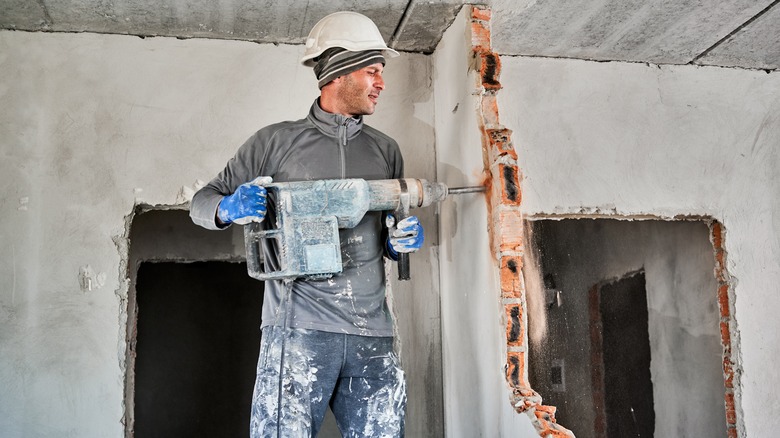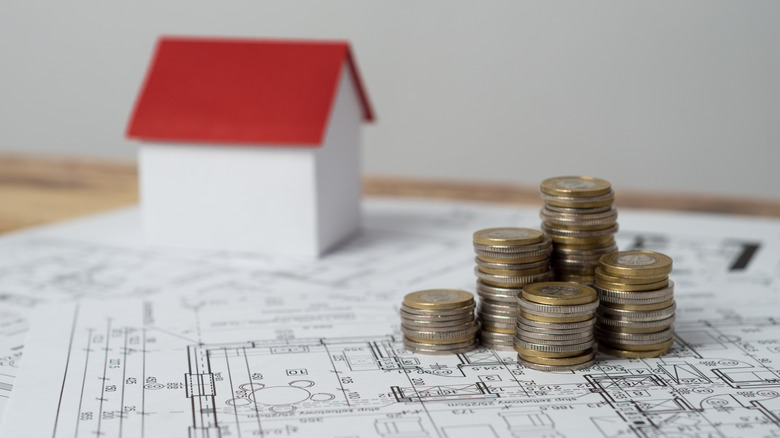5 Things To Consider Before Building A Home Addition
Renovating your property to include extra square footage, newly updated amenities, or other unique new features is a great way to add financial and utility value to your home. A home addition is a wonderful opportunity to remake your property in a way that better suits your family's overall needs. Rather than packing up and moving to a new home, an addition can unlock new potential in the space that you already know and love, explains The Zebra.
But the decision to renovate your home and add new space is a big one. There are many considerations that need to be made before and during a home addition, and it can be difficult to manage the project from start to finish if you aren't already familiar with home improvement timelines and strategies. Even those who are well seasoned in the home improvement and DIY space are likely to struggle to maintain focus and efficiency during such large projects. The first step to getting any home improvement opportunity right is research, and by learning to incorporate these five key features and steps in your addition you can streamline the project and get back to life as normal just a little bit faster.
Establish an end goal for the renovation
When launching into a new project, it is essential to think about the project scope, purpose, and ultimate goal. It's incredibly easy to get bogged down in the minute details of a renovation project. Many tasks will go over budget, beyond your timeline, and grow to incorporate many other aspects — in fact, Men's Health notes that this can present in the form of DIY addiction. This can be detrimental to a homeowner simply looking to make a singular addition to improve their living space. Once a project gets going it can be hard to remain focused on the end goal, but establishing these goals and thinking through your purpose of the renovation can help guide consistency throughout the mission.
It's often useful to flesh out these ideas before consulting with the contractor, and then rehashing them once you've gathered a few quotes and decided on a project manager who will take on your home improvement needs. General contractors are experienced professionals who possess technical know-how and a knack for speaking with homeowners about their needs and strategizing ways to meet them. Working with your contractor to make sense of your project goals and the ultimate reason for renovating the home can help retain clarity throughout the building process.
Research permits and potential restrictions
No matter what kind of home improvement project you are initiating, there are likely to be some permitting requirements or possible restrictions that must be worked around. For instance, when refitting a pool deck, homeowners who don't already have some type of safety installation around the pool's edge will need to incorporate this feature. This restriction is in place regardless of whether you have young children, pets, or any other member of the home that may be vulnerable to drowning issues. Similarly, Design Everest Lounge notes that there are restrictions surrounding how a contractor must deal with load-bearing walls when they stand in the way of project completion.
Angi reports that many contractors will deal with restrictions and permit requirements without involving you in the nitty gritty, but it's important to understand where these potential obstructions or delays may be found so that you can maintain a comprehensive understanding of the project's continued timeline and progress. An informed homeowner is one that can help play an active role in decision-making and strategy. Therefore, it's in your best interest to talk to your contractor about any potential setbacks or requirements and stay informed about the progress and ongoing needs of the job.
Define your budget and timeline
The next key factor for homeowners is in managing budgets and timelines. These often must remain somewhat fluid, but an ill-defined budget can quickly run a project off course and lead to massive changes in scope and cost. The Honest Carpenter suggests having a candid discussion with any type of construction professional you may be thinking of hiring for your project. Speaking about your budget and taking on board any suggestions, notes, or concerns that a contractor might bring to your attention can help you gain a clearer picture of how much the project is likely to cost and how long it will take to complete.
Once again clarity of vision comes into play here and maintaining an understanding of how much the project has already cost, how long left it may take to complete, and other similar factors can help you stay on track financially and minimize the potential for feeling dejected when the project inevitably runs over the expected time.
Approach contractors and get quotes
Obviously, it's important to talk to a number of contractors in order to get quotes and build an understanding at greater technical depth. But it can be easy to misjudge the importance of this step. Angi suggests sourcing at least three quotes from contractors before selecting a partner to proceed with your project. when speaking to contractors about quotes for the work, you have an excellent opportunity to gain a better understanding of the work involved in the update, the length of time it might take to use one material over another, or to incorporate elements of a certain variety versus its alternatives. Contractors understand these nuanced details while homeowners are often woefully inept at planning out the specifics of any kind of addition.
Gaining a greater depth of knowledge through discussions with potential contractors will also help you to understand each potential partner's approach to the task at hand. Just like every computer programmer solves their day-to-day problems in their own unique ways, every contractor will approach a building project with their own style and methodology. Not only does quote collection give you more detailed knowledge about the price and scope of the work, but it also helps you select a contractor that you can trust for the job.
Remember that renovations rarely go completely to plan
It's important to remember that renovations often run into hiccups and may go over budget or over stated timelines. As well, when dealing with plumbing or electrical work there is an element of exploration that comes into play. An addition requires the removal of some elements of your property in order to incorporate a new space that will be stitched onto the side, or perhaps even on top, of your existing home footprint. As a result, renovations aren't as simple as building a new element and then knocking down a wall to facilitate easy movement between the old and new. There will always be setbacks, changes, and surprises involved in the process of home improvement.
These features make hiring a contractor you trust even more important. If you are skeptical of the team performing your renovation, then you may not take suggestions or sudden alterations of the plan for what they are, instead thinking that your contractor might be trying to scam you and bulk up the price of the project. Maintaining a sense of flexibility is essential when engaging in any type of home improvement project (via My Move). Remembering this fact will help you keep your sanity and remain focused on the outcome throughout the addition.





